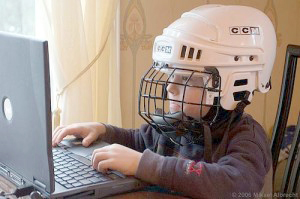The internet poses new challenges for parents. Unlike Television and radios, the internet is interactive and, your child can interact with anyone online. It also allows any user, anywhere to post any information, including materials that are inaccurate, misleading or unsuitable for children.


The internet poses new challenges for parents. Unlike Television and radios, the internet is interactive and, your child can interact with anyone online. It also allows any user, anywhere to post any information, including materials that are inaccurate, misleading or unsuitable for children.
If your child is not "online” already, he or she may soon be joining millions of children who are using the Internet world wide; the internet is full of endless amount of information and resources, it offers children experiences that are educational and rewarding. In addition, being able to use the Internet well may increase a child’s school performance and future job potential.
However, the internet can also present unsafe situations. Some people use the internet to promote things you do not want your kids to be exposed to.
It’s very simple for your kids to find sites with pornographic materials, nasty language, sites promoting violence, inaccurately misleadin and false information or even games with excessive violence, and other things not appropriate for children.
As a parent, should you prevent your child from using the internet? Is there anything you can do to protect your children? Yes there is a way out of the world-wide-web and here are some safety tips to consider as you guide your teens online.
Create a relationship with your children that are conducive to open communication. Open communication and trust is extremely valuable. By letting children know what is expected from them and that their safety is a top priority, they will feel that if something happens, they can approach you to resolve the issue without feeling that they are in trouble.
Banning a child from certain sites may only motivate them to spend more time on them, whereas educating your child on how to keep safe will give them the tools they need to navigate their online world without being hurt.
Teach children what to do if they encounter pornography on a home or public computer.
Keep Internet-connected computers in an open area and not in a teen’s bedroom; children will be less inclined to view and access material that may not be acceptable.
Talk to your teenagers about online adult content and pornography, and direct them to positive sites about health and sexuality.
Computer literate or not, you can still do something about it. Safety on the Internet isn’t about technology-it about common sense. Just as you wouldn’t want your child to meet and share private matters with a stranger in the real world, you wouldn’t want them to do so online.
So, talking with your children about safety on the Internet just means talking to them about common sense. The bottom line is that your children shouldn’t do anything online that they wouldn’t do in the real world.
Parents should act and be the role models of children who are just starting to use the internet.




